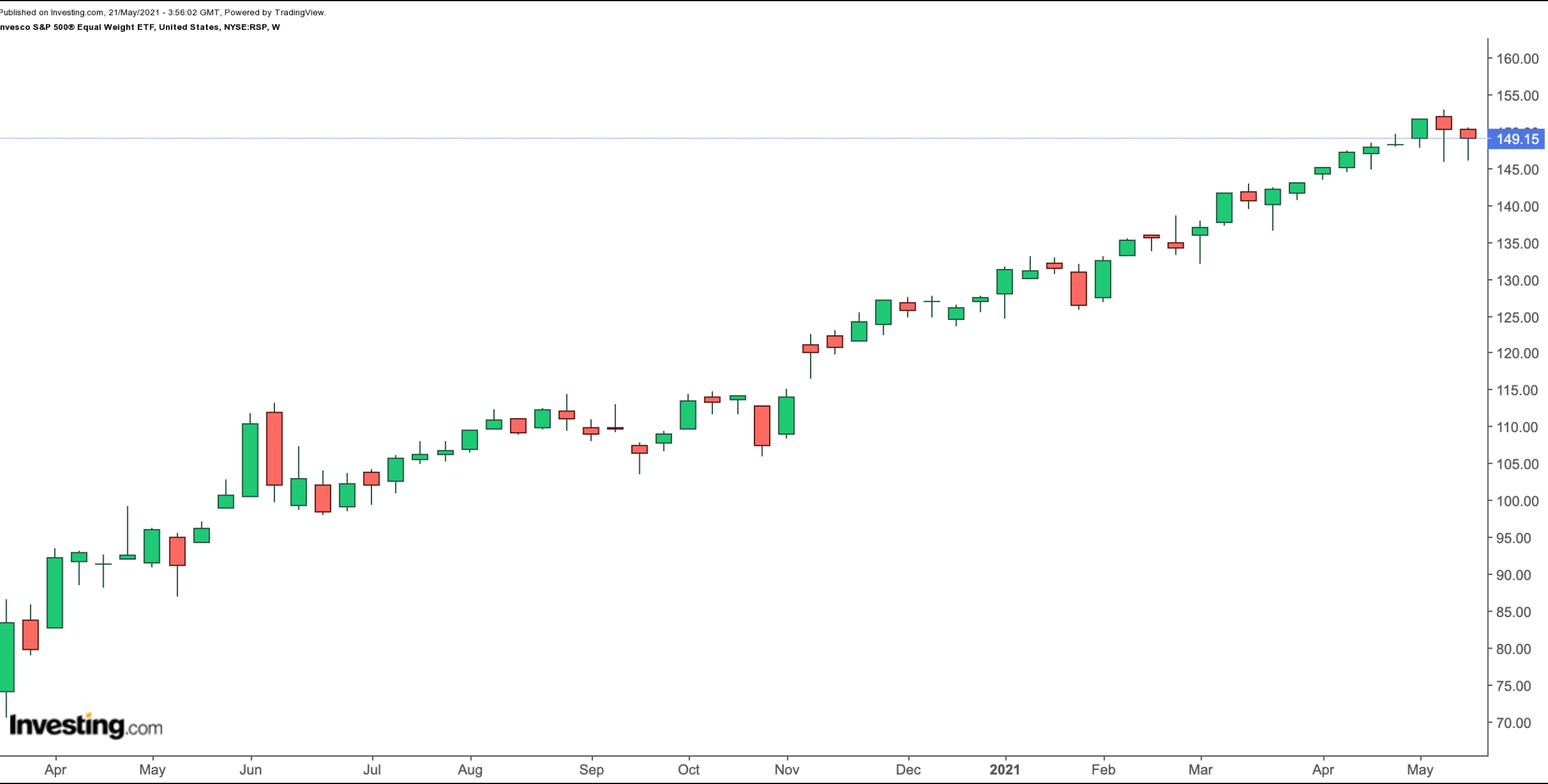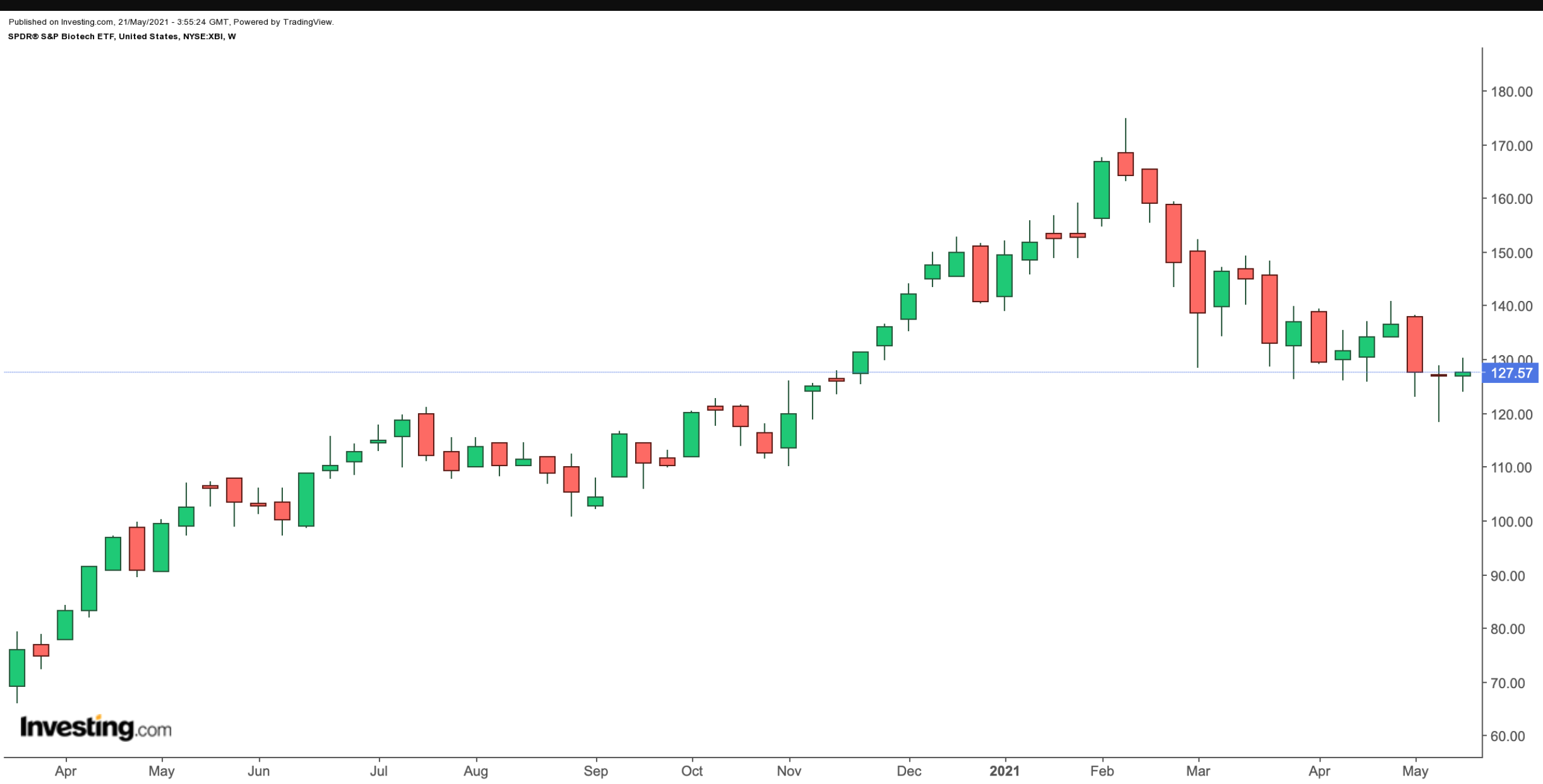Equal-weighted exchange-traded funds (ETFs) invest equal amounts in businesses irrespective of their market capitalizations. Conversely, a cap-weighted index, allows companies with larger market caps to have a significant impact on the index value. In recent decades, capitalization-weighted indexing has become the dominant methodology.
For example, the S&P 500 is a market-cap-weighted index, and the SPDR® S&P 500 (NYSE:SPY) gives access to this index. Apple (NASDAQ:AAPL), whose market cap is $2.08 trillion, has the highest weighting (5.65%) in SPY, followed by Microsoft (NASDAQ:MSFT) and Amazon (NASDAQ:AMZN). The top 10 stocks comprise about 28% of the fund.
Recent research led by Bernd Hanke of Global Systematic Investors and Aneel Keswani Cass Business School in London, concludes that equal-weighted funds offer greater diversification and typically perform better.
Against that background, here are two equally-weighted ETFs that could appeal to investors who do not want to buy top-heavy funds concentrated in a handful of stocks.
1. Invesco S&P 500 Equal Weight ETF
Current Price: $149.15
52-Week Range: $94.86 - $152.85
Dividend Yield: 1.36%
Expense Ratio: 0.20% per year
The Invesco S&P 500® Equal Weight ETF (NYSE:RSP) is an equal-weighted version of SPY. Since its inception in April 2003, net assets have reached $27.8 billion.

RSP tracks the S&P 500 Equal Weighted Index, which equally weights the stocks in the S&P 500 Index. Both the index and the fund are rebalanced quarterly.
The top 10 stocks comprise close to 2.5% of the fund. Among the leading names are the steelmaker Nucor (NYSE:NUE), railroad and line-haul operator Kansas City Southern (NYSE:KSU), consumer credit reporting agency Equifax (NYSE:EFX), electronic data storage group Seagate Technology (NASDAQ:STX) and package delivery giant United Parcel Service (NYSE:UPS). The giant tech companies, including Apple, MSFT and AMZN, each have a weighting of 0.20%.
In the past 12 months, RSP is up almost 56% and has returned 16.1% year-to-date (YTD). By comparison, SPY is up 40.8% in the past year and 9.9% YTD. Put another way, the size factor has meant that RSP has outperformed SPY in recent months. Both ETFs hit all-time highs in early May.
We believe the fund could be appropriate for most long-term portfolios. Its forward P/E and P/B ratios stand at 20.76 and 3, respectively. A potential decline toward $145 or below would offer better value.
2. SPDR S&P Biotech ETF
Current Price: $127.57
52-Week Range: $97.15 - $174.79
Dividend Yield: 0.26%
Expense Ratio: 0.35% per year
This fund comes from the health space. The SPDR® S&P Biotech ETF (NYSE:XBI) invests in 170 biotechnology stocks. The fund started trading in January 2006, and net assets stand at $6.8 billion.

XBI tracks the S&P Biotechnology Select Industry, which is equal-weighted. Around 9.5% of the fund is in the top 10 companies, whose market caps range from $1.1 billion to $63.5 billion.
Among the top names in its roster: Curis (NASDAQ:CRIS), which concentrates on cancer treatments; United Therapeutics (NASDAQ:UTHR), which focuses is on treatment of chronic and life-threatening conditions; biopharma group Alexion Pharmaceuticals (NASDAQ:ALXN); Moderna (NASDAQ:MRNA), which has developed one of the leading vaccines against COVID-19; and Humanigen (NASDAQ:HGEN), which focuses on rare diseases.
Most analysts concur that the biotechnology sector is innovative. The rush to develop vaccines and treatments for the pandemic is a testament to the growth potential of the industry. In the past 12 months, XBI returned more than 21% and hit an all-time high on Feb. 9. However, YTD, the fund is down 11.2%. We like the diversity of the fund. Potential investors could consider investing in XBI around these levels.
On a final note, by comparison, the iShares Nasdaq Biotechnology ETF (NASDAQ:IBB), which is a cap-weighted fund, has returned 11% in the past 12 months, but is down almost 2% YTD. It is another widely-followed ETF with close to $10 billion under management.
Which stock should you buy in your very next trade?
With valuations skyrocketing in 2024, many investors are uneasy putting more money into stocks. Unsure where to invest next? Get access to our proven portfolios and discover high-potential opportunities.
In 2024 alone, ProPicks AI identified 2 stocks that surged over 150%, 4 additional stocks that leaped over 30%, and 3 more that climbed over 25%. That's an impressive track record.
With portfolios tailored for Dow stocks, S&P stocks, Tech stocks, and Mid Cap stocks, you can explore various wealth-building strategies.
